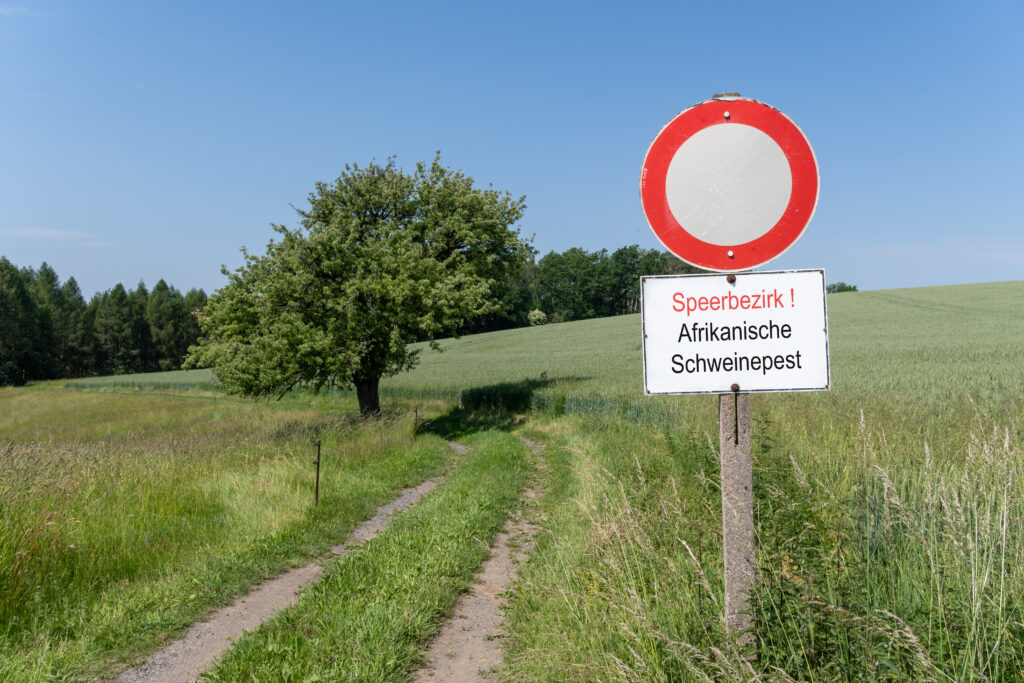Pork from pigs recently infected with African swine fever in Germany reached a butcher’s shop, German authorities have revealed.
An outbreak of ASF was confirmed on a pig fattening farm in the Vorpommern-Greifswald district (Mecklenburg-Vorpommern), in the east of the country in the first week of June. Eight days prior to suspicion of the disease, some animals affected by ASF had been sent to the Tönnies slaughterhouse in Weißenfels.
The abattoir was temporarily closed, while the meat from that day’s kill was disposed of, and opened again at the start of last week, according to German pig industry body ISN.
A statement by the Ostprignitz-Ruppin district administration revealed that subsequent epidemiological investigations found that animals from the affected herd been supplied to, among others, the Dülfer butcher’s shop in Neuruppin.
The Office for Consumer Protection and Agriculture (OCPA) of the Ostprignitz-Ruppin district ordered an immediate halt of production and sales at the Dülfer butcher’s shop while an investigation into the exact whereabouts of the meat was carried out.
It said the company was able to fully prove the whereabouts of the meat delivery, which was then safely disposed of under the supervision of the official veterinarian. After the investigation was completed, the restrictions on the butcher’s shop were immediately lifted.
The OCPA stressed that the Dülfer butcher’s shop was not at fault. “From the point of view of animal disease control, the measures immediately initiated by the authorities were the only alternative and absolutely necessary in order to reduce the possible risk of the ASF pathogen spreading,” it said.
“There was never a danger to human health. ASF is only dangerous for pigs and wild boars. Other animal species and humans cannot become infected with the virus.”
New wild boar outbreak
In a further worrying development in Germany’s ongoing battle with ASF, the virus has been detected in a single wild boar in a new area for the first time, Hesse, south of Rüsselsheim. While the disease, which first hit Germany in September 2020, has been largely contained to the north-east of the country, close to the Polish border, this latest case is near to Frankfurt, on the western side of the country, not far from Germany’s borders with France and Belgium.
The sample from the Hesse State Laboratory was confirmed as ASF by the Friedrich Loeffler Institute, the Federal Research Institute for Animal Health, on Saturday.
The animal was found south of Rüsselsheim near a country road. Measures to prevent the spread have been initiated, including a 15km restriction zone around the site. An ASF coordination group and an animal disease control team has been set up.
ISN said the responsible authorities and institutions have already acted quickly and consistently and said it did not expect the discovery to have a significant impact on the market.
It said: “It was not unexpected that the ASF virus could appear at any time in a new location. How the virus was able to make this new jump is pure speculation at this point. “The experience gained in recent years with the successful containment of ASF in wild boar in the eastern federal states should now certainly be helpful. The preparations made for this emergency and the rapid implementation of the measures are also encouraging.
“Due to the location of the site where the virus was found, the impact on the pig market should also be manageable. Of course, all pig farmers must continue to implement all hygiene and precautionary measures with the utmost care.”




